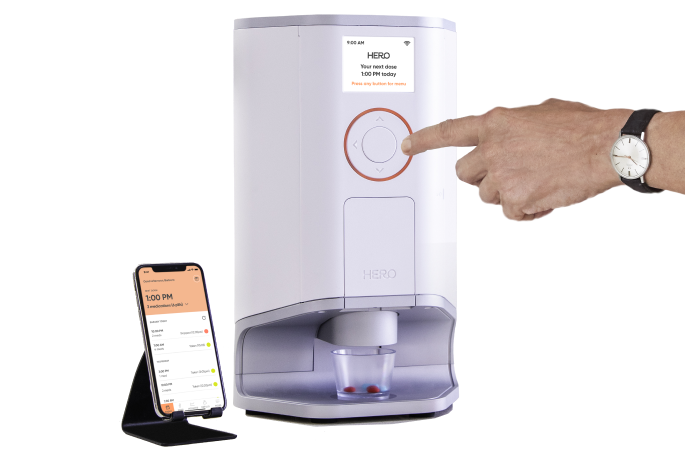How to Support a Loved One With a Chronic Illness

Learning that a loved one has a chronic illness can be heartbreaking. You may feel helpless as you watch your friend or family member struggle, unsure how to show support. What’s worse, your loved one may reject your help or become agitated with you for trying. So what can you do when all your efforts to brighten their day don’t work?
How to Support a Loved One With a Chronic Illness
Understanding Chronic Illnesses in the USA
Chronic illnesses are long-lasting health conditions that require ongoing medical attention and often limit daily activities. In the United States, chronic diseases such as heart disease, cancer, and diabetes are the leading causes of death and disability, as well as major drivers of the nation's $4.1 trillion in annual health care costs.
Prevalence and Impact of Chronic Diseases
Six in ten Americans live with at least one chronic disease, making these conditions a significant public health concern. Rural areas face higher rates of chronic disease prevalence and mortality compared to urban areas, with older adults being particularly affected. Chronic diseases not only impact individuals' quality of life but also contribute to lost productivity on the job, costing the US economy billions of dollars each year.
The Economic Burden of Chronic Health Problems
The economic burden of chronic health problems is immense. When considering both the direct and indirect costs associated with decreased economic productivity, the total cost of chronic disease in the United States reaches $3.7 trillion each year, approximately 19.6 percent of the country's gross domestic product. Direct costs primarily stem from longer and more frequent hospital visits and greater prescription drug use, while indirect costs arise from lost education and job opportunities. The prevalence and cost of chronic disease in the United States are expected to grow over the next several decades, affecting all age groups and placing an even greater strain on the healthcare system.
The impact of chronic illnesses is not evenly distributed across the country, with higher concentrations of chronic disease found in the Mid-South region. Addressing this growing health and economic crisis requires a comprehensive approach that includes chronic disease prevention strategies, improved access to care, and support for individuals living with chronic conditions.

Types and Causes of Common Chronic Illnesses
In today's world, an increasing number of individuals are being diagnosed with common chronic medical conditions. These conditions not only impact the daily lives of those affected but also pose significant challenges to the healthcare system. Understanding the major risk factors behind these illnesses is important for both prevention and management. This section delves into the various types and causes of these chronic medical conditions, shedding light on their prevalence and the underlying factors that contribute to their onset.
Cardiovascular Diseases: Heart Disease and Stroke
Cardiovascular diseases, including heart disease and stroke, are among the most common chronic diseases in the USA. Heart disease refers to several health problems that affect the heart, such as heart attack, heart failure, angina, or abnormal heart rhythm. Factors like high blood pressure, high blood cholesterol, and high blood glucose can increase the risk of developing heart disease. Stroke is another cardiovascular disease caused by blocked or ruptured blood vessels in the brain. High blood pressure is the leading cause of strokes.
Chronic Respiratory Diseases: Asthma and COPD
Chronic respiratory diseases, such as asthma and chronic obstructive pulmonary disease (COPD), are also prevalent chronic conditions. Asthma is a long-term condition affecting the airways in the lungs, causing inflammation and narrowing at times. COPD is a chronic inflammatory lung disease that obstructs airflow from the lungs. It is typically caused by long-term exposure to irritating gasses or particulate matter, most often from cigarette smoke.
Diabetes and Kidney Disease
Diabetes is a chronic illness characterized by high blood sugar levels. Type 2 diabetes is closely linked to overweight and obesity, which can lead to other health problems like heart disease, stroke, kidney disease, eye problems, and nerve damage. Chronic kidney disease (CKD) is a condition where the kidneys are damaged and cannot filter blood as well as they should. Obesity raises the risk of developing diabetes and high blood pressure, which are the most common causes of CKD.
Mental Health Disorders: Depression and Anxiety
Mental health disorders, such as depression and anxiety, can also be considered chronic illnesses. People with chronic medical conditions are at higher risk of developing mental health disorders. For example, individuals with chronic illnesses like heart disease, diabetes, or cancer may experience depression due to the stress and limitations imposed by their conditions. It is essential to address mental health issues alongside physical health problems to improve overall well-being and quality of life.
Three Emotional Support Steps for Managing Chronic Disease
Learning that a loved one has a chronic illness can be heartbreaking. You may feel helpless as you watch your friend or family member struggle, unsure how to show support. What’s worse, your loved one may reject your help or become agitated with you for trying. So what can you do when all your efforts to brighten their day don’t work?
Whether you’ve officially become your loved one’s caregiver or are just a friend who wants to help, there are proven ways you can provide emotional and physical support to someone with a chronic health condition. There are also behaviors that are counterproductive and can cause more harm than good. Here’s what to do (and what not to do) to truly brighten their day.
1. Master the art of listening
People with chronic illnesses often just want to be heard, so here’s how you can listen more effectively:
Listen more than you talk: If your loved one had a rough day, let her vent. Feel free to speak up if you feel like you have something meaningful to add, but always prioritize listening over talking.
Actively listen: Think of listening as an activity you consciously participate in. Ignore any thoughts that pop into your mind, and give your complete attention to the speaker — you may be amazed at how this perks your friend or loved one up.
Share silence with them: Sometimes, words of comfort aren’t the answer. So share some silence with them, even if that means just sitting quietly together. Your presence can often be more comforting than anything you could ever say.
2. Learn how to speak empathetically
If you read our Meditation for Caregivers article, you may remember a helpful practice called noting. In this technique, you name your emotions, which helps loosen their grip on your mind and body. In psychology, this practice is called labeling, and it can be used to show empathy for care recipients and provide them emotional relief.
Empathetic speaking works a lot like noting, except instead of naming your emotions quietly to yourself, you’re verbally acknowledging those of someone else. To do this, listen actively to your loved one, then repeat back the emotion and the physical problem they mention. Here are two examples of what this can look like in practice:
- If they complain about pain in their joints from over-exercising, you can say, “It sounds like your exercise routine really caused you some grief”
- If they express irritation because they didn’t have energy to complete their to-do list, you could say, “Not completing your to-do lists seems like it was really frustrating”
Speaking empathetically shows you understand their experience; you may be surprised to see how it lightens their mood.

3. Celebrate their wins
If you’ve read any personal development books, you may have heard about the idea of celebrating successes. While the technique is great for self-improvement, it can work wonders for the mental health of those with chronic conditions, where every day can feel like a battle.
Licensed Therapist Davina Tiwari, who specializes in caregiving and chronic illness, suggests, “Celebrate their small wins and successes. At a time when they may be receiving bad news on a regular basis, highlighting any and all achievements are important for boosting their sense of self and their mood.”
Three Practical Ways to Offer Support
1. Apply the healing power of touch
Human beings are meant to experience touch. The act can ease depression, reduce stress hormones, and release the “feel good” hormone, oxytocin.
When it comes to caregiving, touch can also play a major role in brightening your friend or loved one’s day. Licensed Marriage & Family Therapist and Registered Caregiver Kirby Maus notes, "Little things make a big difference...holding their hand, a hug, taking them for a walk in their wheelchair, and looking into their eyes while telling them why and how much you love them."
2. Show up as a friend or family member — not just a caregiver
While helping out with household chores, errands, or getting organized are good ideas, also do things you did together before their illness. Cook together, exercise together, and just have fun together.
Tiwari suggests, “Try to give them a fun distraction that gives them momentary relief from thinking about their illness. It's important for them to know that they are not just defined by their illness but rather that they have hobbies, interests, and desires that reflect who they are as a unique individual that is completely separate from their disease.”
3. Let technology be your Hero
Life can be complex and overwhelming for those with a chronic disease. While physically helping out can make a big difference, offering technological tools can also help simplify their lives.
If your loved one has a complex medication regimen, for instance, Hero may be the perfect solution. Our medication management service helps take the hassle out of taking pills and can even help cut down on medication mistakes by improving your overall medication adherence. Included in the service is a smart device that organizes and dispenses up to a 90-day supply of 10 different pills, an app that tracks adherence and sends dosage and refill reminders, refill & delivery, and 24/7 human support if you ever have questions or feedback. With medication no longer a daily burden, Hero can reduce your loved one’s stress and allow her to get some time away from the complexities of medication management.
Complex med schedule? We solved it.
Hero’s smart dispenser reminds you to take your meds and dispenses the right dose, at the right time.

What NOT to Do: Common Behaviors That Can Cause Harm
When providing chronic care for someone, what you don’t do is just as important as what you do. Eileen Davidson is a chronic pain patient who identifies some common practices to avoid:
Toxic positivity: While you may have never heard the term “toxic positivity,” you’ve probably experienced it. Toxic positivity occurs when people offer comfort using common phrases like “Everything happens for a reason,” “Don’t worry, just be positive,” or “It is what it is.” While these sayings are well-intentioned, they may alienate the speaker. So remember, silence can offer more comfort than words. Your presence can be enough.
Unsolicited advice: Just because people vent their problems doesn’t necessarily mean they want advice. Sometimes they just want to be heard. So, remember, if your care recipient shares her struggles with you, listen more than you talk. If she wants advice, she will likely ask for it.
Ableism: While most people wouldn't think they discriminate against disabled people, harmful ableist language is quite common in society. Ableism refers to the discrimination of disabled or chronically ill people in favor of those with normal abilities. For those with chronic illnesses, this happens when their disease isn’t validated. Comments like, “Everyone gets exhausted,” “You’re sickness is a mindset issue,” or “Just push through the pain” can cause emotional distress, failing to acknowledge the illness or seeing it as a deficiency to be corrected.
Managing Chronic Conditions: Prevention and Support
Lifestyle Changes for Disease Control
Managing chronic conditions often involves making lifestyle changes to prevent further complications and improve overall health. Simple modifications can have a significant impact on disease control. For example, maintaining a healthy diet, engaging in regular physical activity, and quitting smoking can help manage high blood pressure, a major risk factor for heart disease and stroke. Additionally, controlling cholesterol levels and monitoring blood glucose can reduce the risk of cardiovascular disease and diabetes, respectively. It's essential for individuals with chronic illnesses to work closely with their healthcare providers to develop personalized plans for managing their conditions.
The Importance of Mental Health in Chronic Illness Management
Mental health plays a crucial role in managing chronic illnesses. People with chronic conditions are at a higher risk of developing mental health disorders such as depression and anxiety. Addressing mental health needs is vital for improving the overall quality of life and ensuring effective management of chronic diseases. Collaborative care that includes both mental and physical health care can lead to better outcomes for individuals with chronic illnesses. It's important for patients to communicate openly with their healthcare providers about their mental health concerns and seek appropriate treatment when needed.
Finding Support Groups and Resources for Chronic Illness Patients
Support groups can be an invaluable resource for individuals living with chronic illnesses. These groups bring together people who share similar experiences, providing opportunities to exchange personal stories, coping strategies, and information about treatments. Support groups can help reduce feelings of isolation, provide emotional support, and improve overall well-being.
To find a support group, patients can consult their healthcare providers or search for local resources through nonprofit organizations, hospitals, or community organizations. The Center for Chronic Illness (CCI) offers free virtual support groups for individuals impacted by chronic illness and rare diseases, facilitated by licensed mental health professionals. Online support groups can also be beneficial for those who may not have access to local face-to-face groups.
How Hero Can Help with Chronic Condition Management
Brightening the day of someone with a chronic illness is a balancing act. You want to be positive but not devalue their illness. You want to help them but not act like they’re helpless. This is why listening is so important: it shows acceptance, validation, and understanding, and it can make a real difference.
Managing chronic illnesses can be challenging, especially when it comes to medication management and adherence to treatment plans. Hero offers a solution that can help to simplify the process and to assist individuals with taking control of their health.

Simplifying Medication Management for Chronic Illness Patients
One of the most common challenges faced by individuals with chronic illnesses is managing multiple medications. Hero's pill dispenser system helps simplify this process by organizing medications in an easy-to-use manner. The dispenser can store and dispense various medications according to the prescribed schedule, potentially reducing the risk of missed doses or incorrect dosing. This user-friendly system may help to alleviate stress and confusion associated with managing multiple medications, allowing patients to focus on other aspects of their health.
Promoting Adherence to Treatment Plans
Adherence to treatment plans is crucial for managing chronic conditions effectively. Hero's pill dispenser system not only organizes medications but also provides reminders to help users take their medication on time. By offering these reminders, Hero can help with increased medication adherence, which may lead to better health outcomes for individuals with chronic illnesses. Additionally, the system can provide healthcare providers with information about missed doses, allowing them to help the user address potential barriers to adherence and to work with the user and caregiver to suggest adjustments to the treatment plans that the user can then choose to implement if they are in agreement with the suggestions.
Empowering Individuals to Take Control of Their Health
Effective communication between patients and healthcare providers is essential for successful chronic illness management. By providing a user-friendly pill dispenser system and promoting adherence to treatment plans, Hero empowers individuals to take an active role in managing their health. This sense of control can lead to improved self-management, better communication with healthcare providers, and hopefully, better health outcomes for those living with chronic conditions.
The Hero smart pill dispenser system offers a valuable solution for individuals managing chronic illnesses. By simplifying medication management, promoting adherence to treatment plans, and empowering patients to take control of their health, Hero can make a significant difference in the lives of those living with a chronic medical condition.
The contents of the above article are for informational and educational purposes only. The article is not intended to be a substitute for professional medical advice, diagnosis, or treatment. Always seek the advice of your physician or other qualified clinician with any questions you may have regarding a medical condition or its treatment and do not disregard professional medical advice or delay seeking it because of information published by us. Hero is indicated for medication dispensing for general use and not for patients with any specific disease or condition. Any reference to specific conditions are for informational purposes only and are not indications for use of the device.



